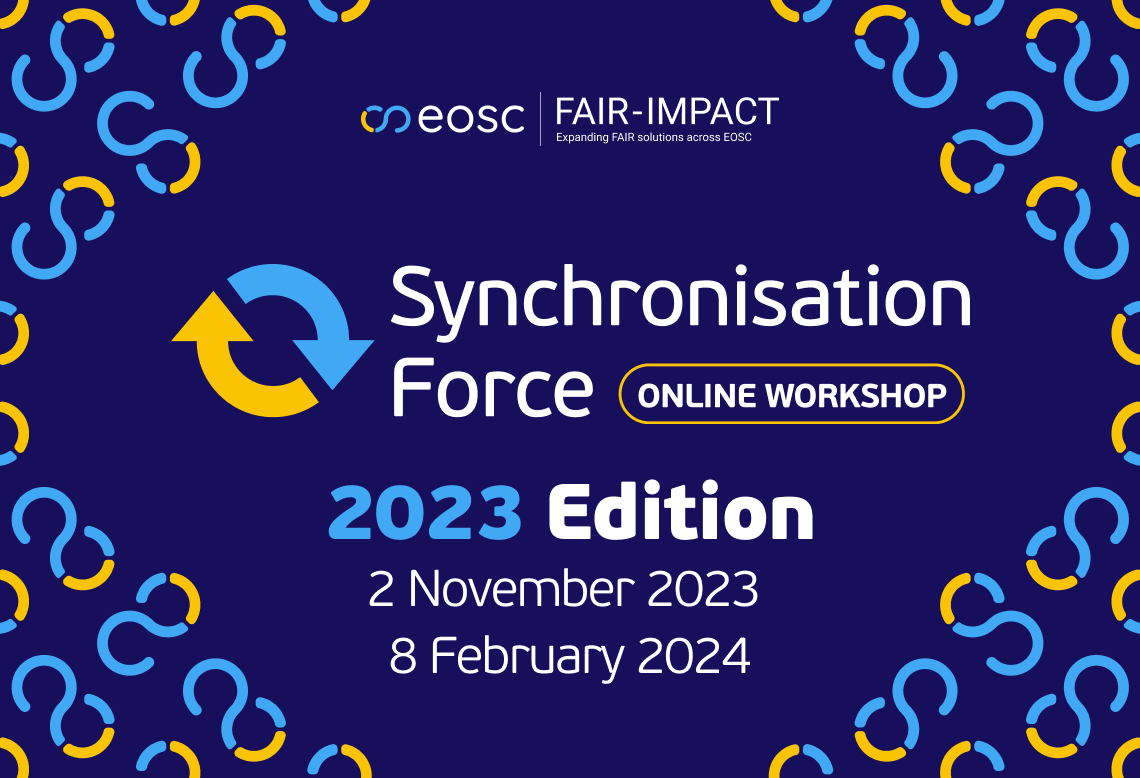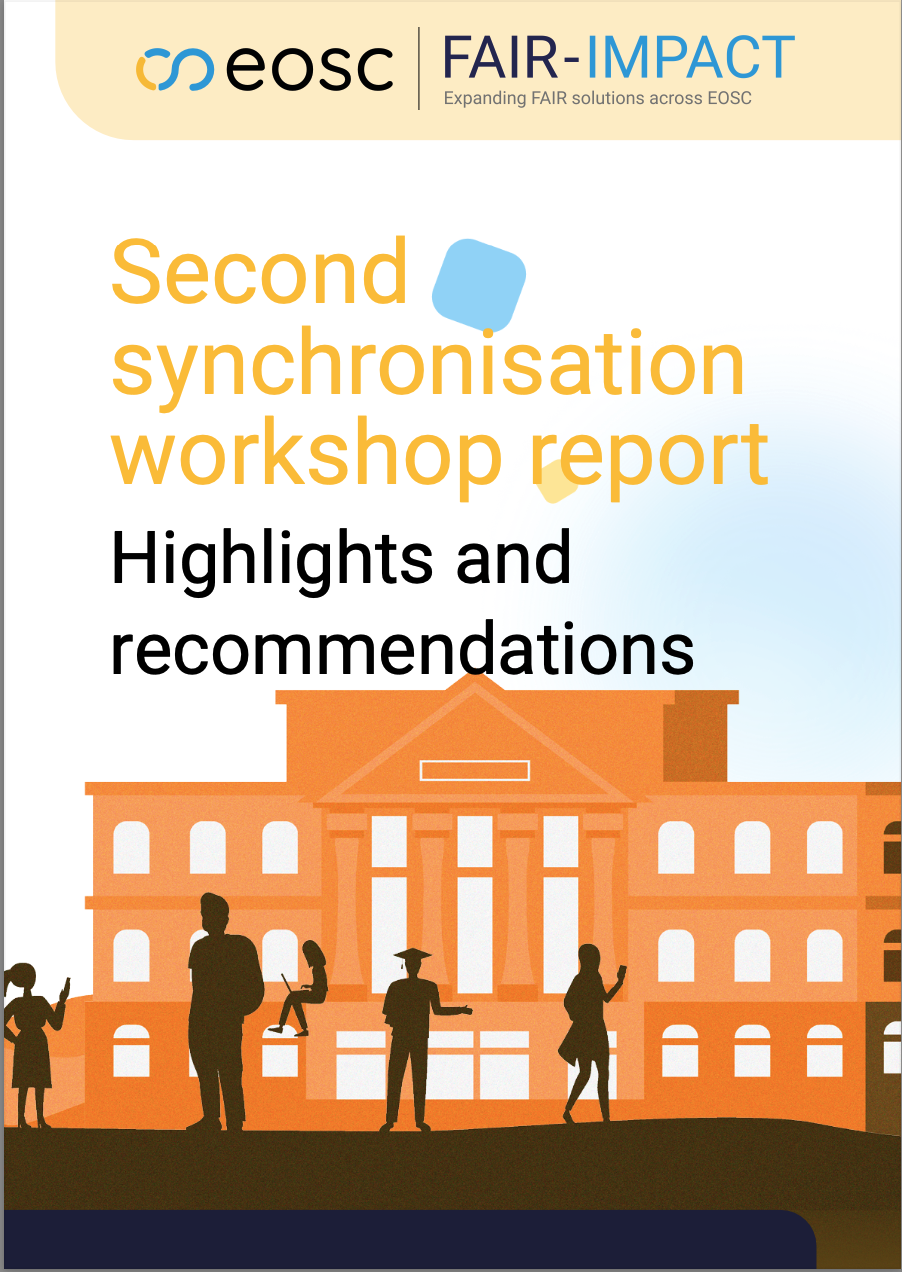Thursday, November 2, 10.30-12.00 CET:
Plenary Orientation session
This orientation session gave an introduction to the FAIR-IMPACT project and guided participants through the Synchronisation Force workshop goals, topics, the benchmark recommendations that would guide the discussion and what was expected from participants.
Download the slides
Topic Session 1: Monday, November 27, 13.00-14.30 CET:
Metrics and assessing FAIRness
Chair: Mike Priddy, DANS
Rapporteur: Maaike Verburg, DANS
In this session, we looked into the metrics, their associated tests, and tools available for the FAIRness assessment of digital objects, but this time concentrating on research software and semantic artefacts, although information and experience with metrics and assessment tools for data objects is most definitely welcome. We discussed current topics, such as discipline specific metrics for FAIR assessments, harmonisation, benchmarking of metrics and tools, and the most effective use and interpretation of tools and their results.
From the last Synchronisation Force workshop on metrics and assessing FAIRness these recommendations were used to guide the discussions and information gathering in this workshop:
- We need to work on a further convergence of metrics and tools, which requires further discussion, synchronisation and alignment;
- We need more domain-sensitive assessment methods, in order to incorporate domain maturity as well as specific good practices and requirements.
- We need assessment tools for other research outputs, like software and semantic artefacts.
- The instrument of FAIR assessment and scoring should be seen and used as the starting point for assistance and improvement.
The EOSC Multi Annual Roadmap (MAR) objectives relevant for this workshop are:
- Objective 2 - European level priority F “Focus on community-specific FAIR metrics and data quality constraints (especially on the interoperability of these) by engaging with research clusters to apply FAIR in their contexts. (2025)”
- Objective 2 - European level priority G “Support the emergence of a widely representative governance body around FAIR metrics and assessment.”
- Objective 2 - Institutional level priority L “Support research communities to adopt both general and domain-specific standards to increase adoption of FAIR practices and reuse.”
Expected outcomes
The metrics-workshop expected outcome was to assess the usage of FAIR assessment metrics and tools with a particular interest in domain-specificity and non-data digital objects, and the status of implementation of FAIR practices with respect to disciplines and domains of the participants.
Download the slides
Topic Session 2: Tuesday, November 28, 10.30-12.00 CET:
Metadata, semantics and interoperability
Chair: Esteban Gonzales, UPM
Rapporteur: Anne-Sofie Fink, DeIC
Interoperability is one of the FAIR Principles that recently has taken up more and more attention. Interoperability will often be the more challenging one of the four principles - indeed when we want to address interoperability across scientific domains. In this session we explored the subject of semantic and technical interoperability within and across scientific domains. The aim of the workshop was to explore the semantic and technical interoperability adopted by representatives from different research communities and institutions to explore their compliance with the EOSC Interoperability Framework’s recommendations. We expected participation from different scientific domains in order to get a picture of their semantic and technical practices. Our point of departure for addressing semantic and technical interoperability was the EOSC interoperability framework.
Questions explored during the session
- What does your project/institution/community do to implement semantic artefacts (ontologies, schemas, standards, vocabularies, etc) into your (meta)data? Please provide any relevant links (data policy, schema, repository, catalogues, etc.) and challenges to implement them.
- In your project/institution/community, do you publish your (meta)data following FAIR principles? Please provide any relevant links (data policy, guidelines, training courses, etc.) and challenges to implement them.
- Do you reuse data from other projects/institutions/communities? Please provide any relevant links of examples and the challenges met to reuse them (For example, provide sufficient information to reuse/ trustworthy). Specify if you plan to reuse data in the future.
- What are the worst data practices adopted in your project/institution/community? (For example, not using PID, clear data policy, etc.)
Expected outcomes
The cross-workshop expected outcome is to assess the status of the implementation of the EOSC IF recommendations in the components and services present in cross-domain environments. These results will be used to create guidelines for the usage of components for semantic and technical interoperability in cross-domain use cases.
Useful references:
Download the slides
Topic Session 3: Thursday, November 30, 10.30-12.00 CET:
Persistent identifiers
Chair: Josefine Nordling, CSC
Rapporteur: Liisa Marjamaa-Mankinen, CSC
The goal of this session was to provide input for the PID Policy assessment regarding the more qualitative factors, especially those related to trust and sustainability. The session began with short presentations of the PID Compliance Assessment Tool done in FAIRCORE4EOSC and the integrated PID use cases in FAIR-IMPACT. Representatives of these use cases, PIDs in data production workflows, PIDs in complex data citation and PIDs and sensitive data, reflected on the relevant PID solutions and requirements and identify gaps. They also described how they evaluate different PID services and systems.
Following this, the workshop will be organised around three questions:
- 1. What does your project or initiative do to implement PIDs? (Please provide any relevant links.)
- 2. What are the guiding principles for you when choosing a PID system or service?
- 3. What does in your opinion constitute trust in a PID service?
In the EOSC context this session is related to the objective OO11 Implement the EOSC persistent identifier (PID) policy and architecture by 2025 in the Strategic Research and Innovation Agenda and relates to the following recommendations in the draft EOSC Multi-Annual Roadmap (MAR) 2025 and 2026–2027:
- Promote and sustain the use of Persistent Identifiers (PIDs) that are already common practice. Support activities where PID usage is not yet a common practice. (2.1 A, 2.2 H)
and it supports the national and institutional level recommendation:
- Integrate widely used and adopted PIDs into institutional services and incentivise usage of PID technologies being developed in EOSC (like PID Meta Resolver, Data Type Registry, PID graph, PID Policy Compliance Assessment Toolkit). (2.2 I, 2.3 K)
In this session work we will also use some recommendations from the Knowledge Exchange report on PIDs, read more: https://www.knowledge-exchange.info/event/pids-risk-and-trust
The expected outcome of this session is to produce a short report on the current PID landscape in conjunction with EOSC and EOSC PID Policy implementation, as well as to provide input for PID policy assessment CAT especially regarding the more qualitative assessment.
Download the slides
Topic Session 4: Tuesday, December 5, 14.00-15.30 CET:
Trustworthy and FAIR-enabling repositories
Chair: Joy Davidson and Laurence Horton, DCC
Rapporteur: Maaike Verburg, DANS
In this session we discussed the current mechanisms and cooperation opportunities for Trustworthy and FAIR-enabling repositories. We looked into the wider range of transparency and trust, and the incremental and sustainable support needed. This session aimed to pick up on progress against the three recommendations identified from the 2022 Synchronisation Force session which were to:
- Measure the percentage of repositories in EOSC that will have a certification such as CoreTrustSeal or expose trustworthiness using other mechanisms
- Provide incremental, continuous and sustainable guidance and assistance to repositories, and certification processes
- Contribute to cooperation across the current initiatives to build and sustain a network of trustworthy digital repositories
Questions that participants in this session will explore:
- 1. What is your project or initiative doing to help define trustworthiness?
- 2. What is your project or initiative doing to increase the number and visibility of trustworthy, FAIR-enabling and/or certified repositories?
- 3. In your project, initiative, or community, do you work with repositories that consider themselves to be trustworthy and/or have a certification such as CoreTrustSeal?
- 4. For those repositories that are not certified, is any support or guidance provided to help them to expose their trustworthiness using other mechanisms?
- 5. Are you planning to sustain your activities and/or efforts? If so, how? How can we best work together to progress a network of trustworthy digital repositories?
Expected outcomes:
This session will provide an update on some of the recent efforts to improve the availability and visibility of trustworthy and FAIR-enabling repositories and to consider whether any of these can be leveraged to assist the ongoing monitoring the repository landscape by the EOSC Association.
Conversation starters for this session include:
- Nina Weisweiler, Helmholtz Metadata Collaboration on the COREF update of the re3data metadata schema
- Francoise Genova, Strasbourg Astronomical Observatory on RDA France support for CoreTrustSeal certification of data repositories
- Ilaria Nardello, EOSC Association on EA Member survey outcomes related to certified repositories
Download the slides
Topic Session 5: Thursday, December 7, 15.00-16.30 CET:
Legal & organisational interoperability
Chair: Olivier Rouchon, CNRS
Rapporteur: Anne Sofie Fink, DeIC
Legal interoperability seems sometimes to have been overshadowed by semantic and technical interoperability in the EOSC interoperability framework.However, legal interoperability is of almost importance for realising the EOSC as a web of FAIR data and related services. Legal interoperability is about ensuring that organisations operating under different legal or organisational frameworks, policies and strategies are able to work together. This might require that legislation does not block the establishment of European public services within and between Member States and that there are clear agreements about how to deal with differences in legislation across borders, including the option of putting in place new legislation. In this session we picked on the issues of legal interoperability in the perspectives of different scientific domains.
Recommendations to be assessed during the session
From the EOSC Interoperability Framework
Selected legal/organisational interoperability recommendations:
- Organisational
- Usage recommendations of standardised data formats and/or vocabularies, and with their corresponding metadata.
- A clear management of permanent organisation names and functions needs to be provided.
- Legal
- Standardised human and machine-readable licenses, with a centralised source of knowledge and support on copyright and licenses.
- A clear list of EOSC-recommended licenses and their compatibility with Member States’ recommended licenses.
- Tracking of license evolution over time for datasets.
- Identification of different parts of a dataset with different licenses.
- Harmonised policy and guidance to dealing with cases where patent filing or trade secrets may be compromised by disclosure.
- GDPR-compliance for personal data.
- Harmonised terms of use across repositories
- Alignment between Member States national legislations and EOSC.
Download the slides
Agenda
| Timeslot |
Topic |
| 10:30-10:40 |
Welcome and recap of the workshop series: Marjan Grootveld, DANS |
| 10:40-10:55 |
Metrics and assessing FAIRness: Maaike Verburg, DANS
5 min + 10 min discussion |
| 10:55-11:10 |
Persistent Identifiers: Josefine Nordling, CSC
5 min + 10 min discussion |
| 11:10-11:25 |
Trustworthy and FAIR-enabling repositories: Marjan Grootveld, DANS
5 min + 10 min discussion |
| 11:25-11:40 |
Legal & organisational interoperability: Olivier Rouchon, CNRS
5 min + 10 min discussion |
| 11:40-11:55 |
Metadata, semantics and interoperability: Esteban Gonzalez, UPM
5 min + 10 min discussion |
| 11:55-12:00 |
Wrap-up |
Download the slides

